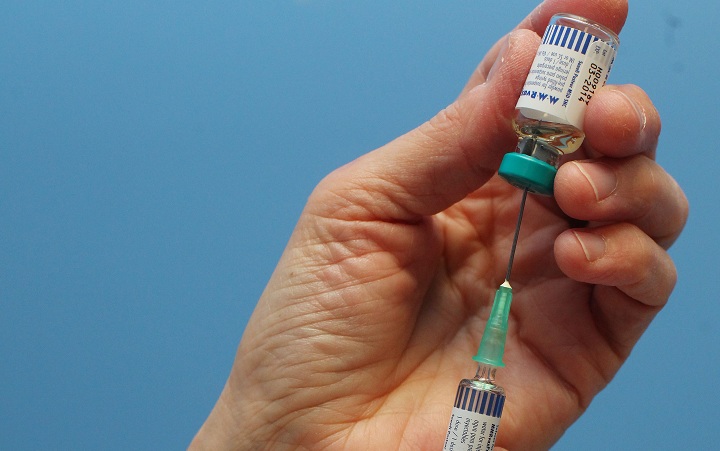TORONTO — It’s been a contentious year for parents as outbreaks of preventable diseases such as measles and chicken pox took their toll on kids across North America. Doctors blamed an anti-vaccination movement — now, a new Canadian study suggests that the combined MMRV vaccine may cause febrile seizures in young children more so than separate inoculations.

But the Calgary doctors leading the research are reassuring the public: these vaccines are completely safe and risk of seizures is rare.
“Parents should be assured that we are continually monitoring vaccine safety and watching for rare adverse events. It is reassuring that the extra risk is still very low…” said lead researcher Dr. Shannon MacDonald.
“The most important thing is to vaccinate your child, whether it is with separate or combination vaccines,” she told Global News.
READ MORE: Anti-vaccination movement means preventable diseases making a comeback
MacDonald is a registered nurse and University of Calgary researcher studying vaccine safety and parents’ decision-making around immunization. She’s also a mother of two small children, she notes, so she can relate to the anxiety parents feel about making sound health care decisions for their kids.
Her research, published Monday in the Canadian Medical Association Journal, is timely. Along with measles outbreaks, whooping cough, chicken pox and mumps have also resurfaced in the Western world. Doctors have pointed to one culprit: a steadily growing anti-vaccination movement.
MacDonald’s research considers the MMRV vaccine. A common hesitation parents have about vaccination is the number of needles their very young kids have to deal with. The solution was to combine the MMR — measles, mumps, rubella — vaccine with the chicken pox — or varicella — vaccine to create an MMRV dosage.
Right now, the MMRV is given to kids in Alberta at 12 months old and again between four to six. In total, the MMRV vaccine is used in nine provinces.

Get weekly health news
READ MORE: Which Toronto schools have the lowest measles vaccination rates?
A U.S. study suggested that the combined MMRV vaccine increased the risk of febrile seizures compared to MMR and varicella vaccines doled out separately. The thing is, the U.S. uses a different MMRV — called ProQuad. MacDonald wanted to know if the MMRV vaccine Canadians use — called Priorix-Tetra — came with the same results.
And to clarify to concerned parents: febrile seizures are convulsions brought on by high fever, typically in babies and young kids. The fever is usually linked to infection, such as a cold, influenza or an ear infection. But the fever can also be caused by a recent immunization. These seizures don’t have any long-term effects, though.
“They can be distressing to parents and result in visits to emergency departments and doctor’s offices,” MacDonald said.
MacDonald’s study looked at all 12- to 23-month-old children in Alberta who received their first dose of the measles vaccine between 2006 and 2012. Her team linked data on immunization status with data on ER visits, hospitalizations and doctors’ visits due to febrile seizures.
READ MORE: What caused a whooping cough epidemic? Scientists blame parents
The MMR vaccine also comes with a small risk of these seizures, but the risk is twice as high with the MMRV vaccine. It’s still very low though — about an extra three or four seizures per 10,000 doses. For some perspective, if you don’t vaccinate your kids, 60 to 70 per 10,000 cases encounter a seizure.
“If you have ever seen a child in the ICU on a ventilator as a result of contracting whooping cough or having a foot amputated due to meningococcal disease — both of which I have seen — you would not doubt the value of immunizing children against diseases,” MacDonald told Global News.
Then there’s the risk of pneumonia, brain inflammation and even death from refusing vaccinations, she said.
“The challenge in communicating this to parents is that most have not seen the devastation that some of these diseases can cause. Fortunately, most parents appreciate the benefits of vaccines and immunize their children,” MacDonald said.
READ MORE: 6 vaccination myths debunked
So what should parents, doctors and health officials do with this research in mind? For starters, parents should be counselled about the risk of fever post-vaccination. They can keep a close eye on their kids for fever within the next seven to 10 days when the risk of a seizure is heightened.
Medications like acetaminophen (Tylenol) and ibuprofen (Advil) can also help fight fever.
“It is a matter for debate whether the choice of separate versus combination vaccine is a policy decision or a choice for parents to make in consultation with their vaccination providers,” MacDonald concludes in her paper.
READ MORE: How do you treat the common cold? Here’s what works and what doesn’t
In the meantime, she hopes her findings are reassuring to parents. The risk of seizures are low in the MMR and MMRV vaccines, and doctors are being transparent and forthcoming about the potential side effects, she said.
Read her full findings here.
carmen.chai@globalnews.ca
Follow @Carmen_Chai








Comments